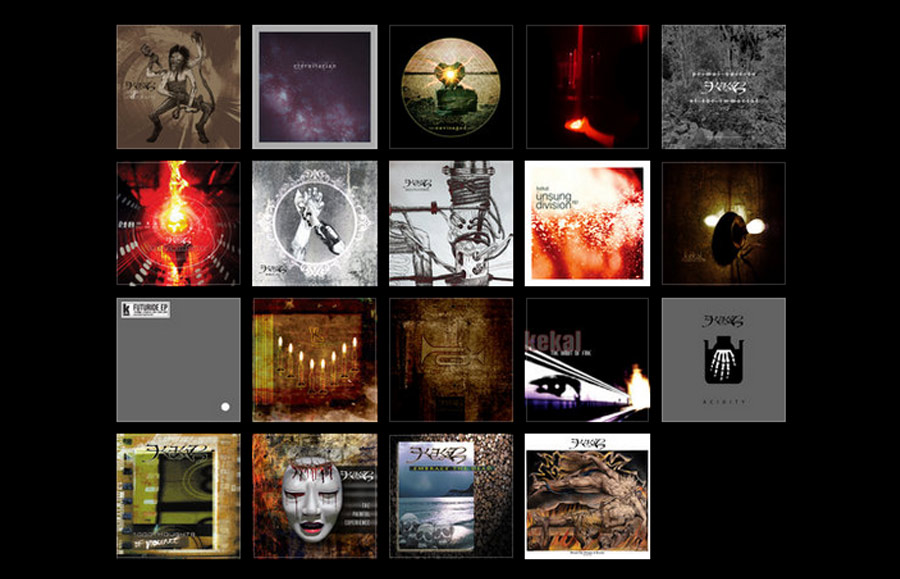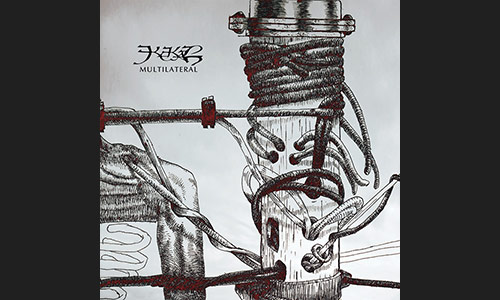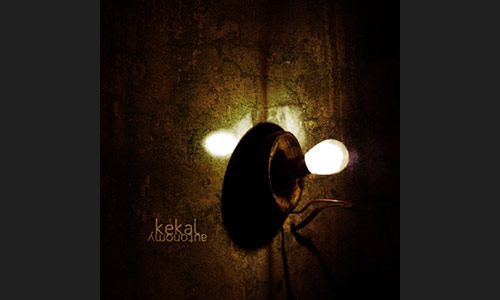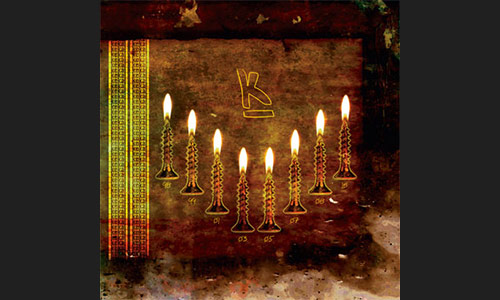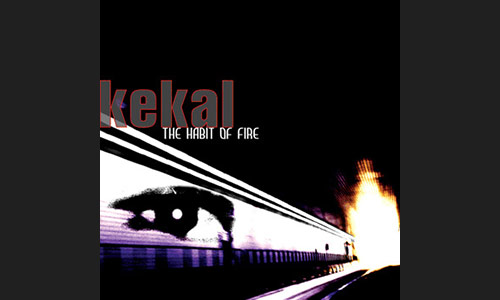Audible Minority (2008)
7th full-length studio album
Release Dates
Kekal, December 2008 (digital)
Whirlwind Records, December 2012 (CD)
Kekal, July 2018 (digital)
Track Listing
- The Vampire Song
- Conditional Destiny
- Against
- Ceasefire Negative
- Between Us
- For The Greater Good and Evil
- Narrow Avenue
- Virtue of Perseverance
- Shuffling Biorhythms
- All That Matters
Bonus Tracks
- Locust (A-ha cover)*
- Redemption (Johnny Cash cover)**
*2008 version download-only bonus track
**2018 re-mastered version download-only bonus hidden track
Album Description
The title "Audible Minority" is based on the fact that the music on the album has mapped itself into the extreme minority status: something beyond recognition of the musical norms. "Audible Minority" is a stateless, nameless, and label-less manifesto made from all the bitterness and pain. The album that is entirely bleak, gloom and dark.
A perfect collision of metal and extreme electronic music with dark, stripped-down emotional jazz and blues elements. Kekal combines organic rock instruments with the use of multilayered 'power electronics' feedback noises, loops, samples, Moog synths, turntable scratches and theremin, to mention some. Almost 2 years in the making, "Audible Minority" was constructed during various personal events of the band members' lives.
Release Note
CD version of "Audible Minority" was first released in December 2012, as bonus CD of "Autonomy" limited deluxe-edition 2CD by Whirlwind Records.
In 2018, the entire album was entirely re-mastered and re-issued digital only as the 10th Anniversary edition.
Credits
Line-up: Jeff Arwadi, Leo Setiawan and Levi Sianturi
Prepared, sampled, arranged, programmed & performed by Jeff Arwadi
All songs written by Jeff Arwadi (except the noted bonus tracks)
Produced, engineered and mixed by Jeff Arwadi
Thanks to Darryl Neudorf & Damon DeSzegheo for production inputs
"The Vampire Song" additional engineering by Jelena Glisic
Production workstations:
The Palace Room Studios, Toronto - Ontario, Canada
Jeff's mobile laptop recording, anywhere else
Digitally re-mastered in 2018 by Jeff Arwadi at Ideation Station
Hand-drawn Illustrations by Levi Sianturi
Photos, cover concept, artwork & lay-out design by Jeff Arwadi
Downloading/Purchasing/Streaming Information
Physical CD (2012 version)
Limited deluxe-edition double-CD released by Whirlwind Records [SOLD-OUT].
"Audible Minority" is a bonus CD of a limited deluxe-edition double-CD with the 2012 album "Autonomy" as the main disc and 16 pages full-color booklet covering both albums' visual artwork. This version comes in a limited hand-numbered copies.
Digital Download (2018 re-mastered version)
Streaming (2018 re-mastered version)
Spotify, Apple Music, Deezer, Google Play Music, and more.
Music Video + Audio Streaming
Insights - Jeff talks about the album "Audible Minority"
August 29, 2010
Notes from Jeff, in 2008 prior to the album release:
"Audible Minority" is a very difficult album for me, both technically as well as emotionally, because I had to use many different DAW programs, different places and different computers to record as well, even within one session/one song. There were lots of technical challenges and headaches (literal headaches). Emotionally, all those 'drifting' atmosphere made me feel like a nomad; taken-out-of-home and being exiled. The good thing is that I didn't set-up any deadline, so I let the music finish by itself. To be honest, I don't see "Audible Minority" as a complete album, I see it as a continuing process, or as a bridge to the future unknown. This is an album which ends with triple dots, not with a period. It's like snapshots of certain moments within a dark journey, and the journey continues. All of the band members were having their own personal struggles in life when the songwriting started, and it continued as the music shaped itself. Most of the (limited) communications between me and other members at that time were never about discussing the music, but all about sharing our own problems. I had to deal with all the songwriting and recording on my own this time, because of the geographical reasons as I was moving to a different country. There were times I thought that it was impossible to finish the album myself, and even there were times I thought about quitting the band as I was not having a good time working on this album. All I felt was the overwhelming sorrow, but I could not stop doing it. Making music is the only therapeutic way, to ease myself from the pain. The main concept of "Audible Minority" is all about perseverance and facing the life itself. Musically, it turned out to be a very dark, low-key and introspective album ever made under the name of Kekal. Be forewarned: Don't expect yourself to bang your head while listening to "Audible Minority". There are traces of extreme-metal at some points, but they collide with extreme electronic elements (with the use of multilayered power electronics, Moog synths and theremin) as well as dark, stripped-down emotional jazz and blues. I don't want to call this album 'experimental' or 'progressive', I prefer to call this 'expressional'...It all began in September 2006, before the release of "The Habit of Fire", and continued to shape itself up until May 2008.
Speaking about the obvious musical distinction of "Audible Minority" compared with the band's previous albums, Jeff also added in 2009:
It's all natural, but in recent years there are lots of changes in our lives.. One good example, I moved to Canada in 2006, and now I live in a city with less than 1.5 million population with all the cold 6-month winter here, so compared with the city I used to live, Jakarta, it's like 180 degree difference.. It would add the level of my musical preferences, for example I no longer listen to any metal music this year, totally, because I no longer enjoy listening to it.. So there is no way I can do any metal music these days, unless I am being dishonest to myself, but I prefer to be honest and do what I am comfortable to do..
"Audible Minority" is considered as your most personal album to date, not only you did it entirely by yourself, but the lyrics also seem to be very personal. Do you like how the album turned out to be?
Well, do I like it..? Not so much, but is the album important to me..? I would say, yes, surely 100%.. I don't care whether people see it as my own solo-album or Kekal album, but it is part of the journey, and life itself is a journey.. I was depressed during that period, so it affected the songwriting and it affected my vocals too, like my ability to hit higher notes as well as to maintain pitch.. I started to write the songs in a more hopeful mode, then progressed in a more and more pessimistic mode.. I had to redo the takes quite a number of times, mainly because of the difference in moods during the initial recording and the progress that follow.. For example, I tracked a melody layer on guitar, then few weeks later I ended up hating it because I was in a bad mood and it sounded too bright and happy, then I replaced it with just the feedback noise, only to replace it again later with a synth sound.. The vocals are one element that I dislike on that album, they sound too lazy and unwilling, but I didn't have much energy and enthusiasm back then so it was the best thing I could deliver..
Kekal released its first album in 1998, in which, many people would describe it as straight-forward "black/death metal" album, but then there are stylistic shiftings occur subsequently on album after album, and "Audible Minority" is the album where the term "metal" is no longer fit to categorize it. How come?
Kekal is our own parallel universe, I mean our music is basically a reflection of our own lives.. As we see music as a whole, it is very natural to have us switching styles, genre-wise.. It's like changing clothes, like you can wear a tuxedo suit today and t-shirt and short-pants yesterday.. You see that we do more electronic than organic lately, because we don't have time to work on music the organic and traditional way, like jamming together and having regular rehearsals.. But if you take out and strip all the electronic elements of our current albums and also the organic elements of our older albums, all you have is the core of Kekal and you will see they are all the same..
Get All Kekal Digital Releases
Get the entire Kekal digital album discography (a bundle of 19 Kekal digital releases sold on Bandcamp including 13 full-length albums and 4 EPs) for only $29 USD. That's a 50% off a-la carte price.
A great way to check out the music of Kekal.
